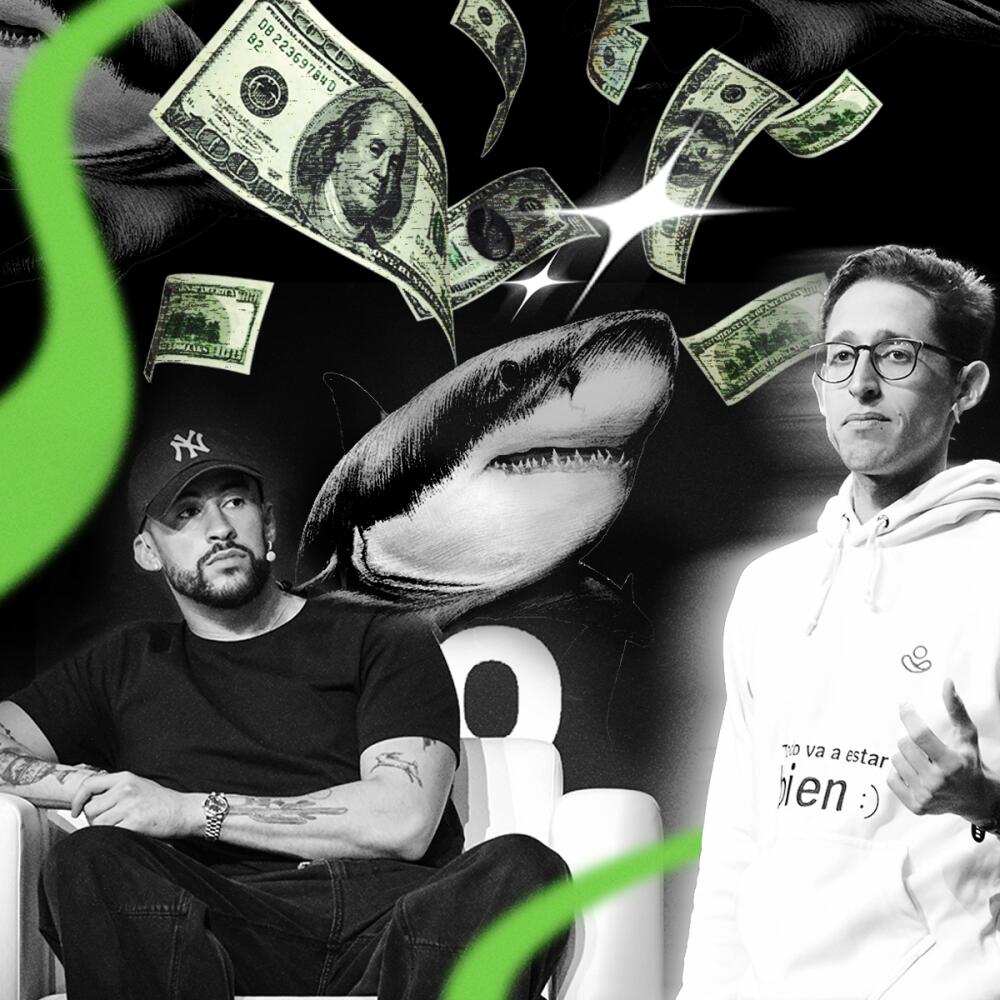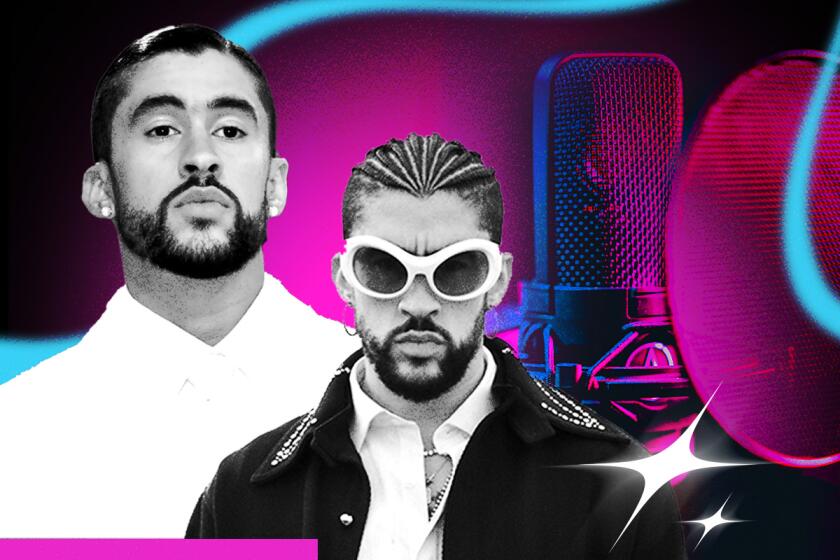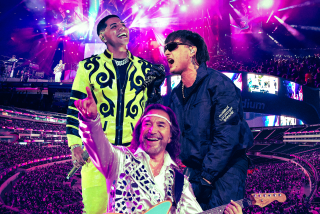
¡Aquí llegó tu tiburón!
Grammy-winning reggaetón superstar Bad Bunny touched down in Cleveland earlier this week — not for one of his bombastic live shows, but for the Forbes Under 30 Summit, where he played the top judge of his own “Shark Tank”-inspired competition.
Bad Bunny announced his new album, ‘Nadie Sabe Lo Que Va a Pasar Mañana,’ will be released on Friday the 13th.
Forbes Magazine opted to host its annual entrepreneurs’ summit in Cleveland this year, citing its legacy as “the city that produced the world’s first billionaire,” American oil magnate and philanthropist John D. Rockefeller. On Monday morning, hundreds of hopeful young Rockefellers-to-be filed into the Cleveland Public Auditorium for the four-day networking bonanza, where the dress code was a loosened-up business cazj (read: blazers and sneakers).
The agenda for the week boasted a bevy of esteemed guests, such as Halsey, Latto, and the Cleveland-raised rap-rock star Machine Gun Kelly, who hosted his own town hall. Other presentations included talks with comedian and spiritual revolutionist of “The Office” fame, Rainn Wilson — as well as reality TV star-supermodel Kendall Jenner, who drew in a substantial number of “Keeping Up with the Kardashians” viewers, all-American girlbosses and those genuinely keen to find out how and why she started an eco-conscious tequila brand. (A.K.A. me.)
Get the Latinx Files newsletter
Stories that capture the multitudes within the American Latinx community.
You may occasionally receive promotional content from the Los Angeles Times.
Jenner’s heart-to-heart with Moira Forbes, executive vice president of Forbes, was followed by the special contest helmed by her latest beau: 29-year-old Benito Martínez. Titled “Bad Bunny’s Under 30 Latinx Pitch Competition,” the live contest showcased five young entrepreneurs from Latin America and its diaspora. Greeted with the frenzied fangirl screams of Latinas in the audience, the Puerto Rican Forbes Under 30 honoree appeared onstage in a basic Yankees cap, tee and jeans — a classic fit for a top mogul in 2023 — and was joined by Latinx business owners Cami Téllez (Parade), Arturo Elizondo (EVERY) and Jomayra Herrera (Reach Capital).
The prize, which included a $100,000 jumbo-sized check from Bad Bunny, and $200,000 in additional funds from Forbes, was ultimately awarded to Jaime Castro, a native of Barranquilla, Colombia, who is the co-founder of the Latinx mental health platform Selia. First established in Colombia, Selia helps pair Spanish speakers with virtual therapists from all over Latin America.
“Though everyone here was worthy of winning, we decided that Selia is the winner!” said Bad Bunny in Spanish. (To the chagrin of his Johnny-come-lately gringo fans, he spoke only in Spanish.)
Selia made for an especially apt choice, given that World Mental Health Day happened to fall on Oct. 10. Now that the Selia network includes providers in Mexico, Brazil, Argentina, Ecuador and Panama, Castro told The Times that the company’s next frontier is the United States, where Latinos are often thwarted by language barriers and a lack of cultural competence among providers. The 2021 National Survey on Drug Use and Health estimated that nearly 22% of Hispanic and Latino Americans reported having a mental illness, and only 36% received mental health services.
“The rate of growth for Latinos in the world is outpacing the capacity [for mental health services],” Castro said. “So many Latinos are migrating and having children, and there’s a huge gap in care — not to mention [there’s a] stigma that Latinos still carry [regarding] therapy and mental health. We thank Benito for getting involved in this mental health revolution.”

While the other judges looked for the most sustainable business model, Bad Bunny said he sought out a quality more “energetic” than anything else. “I’m looking for a passionate speaker, [with] a certain magic in their eyes,” he said cryptically. (I think I know what that means, but really, I chalk it up to him being an intuitive Pisces.)
Other proposals presented on Monday included a pitch for a Spanish edition of “Let’s F—ing Date,” an Instagram Live dating show turned romantic card game created by Argentine American influencer Serena F— Kerrigan. (That is, no joke, her legal name!) Kerrigan was followed by Dominican engineer Gerardo Mateo, who pitched GLASS: an e-commerce platform created to better connect governments with small businesses. Then came Geojam, a social media platform that L.A. native Sarah Figueroa designed to strengthen ties between friends through writing prompts. Lastly, Leadsales founder Roberto Peñacastro pitched his Meta-affiliated customer service platform by ... rapping a bespoke version of Bad Bunny’s smash hit, “Titi Me Preguntó.”
“Nice flow,” said Bad Bunny. (“Way to kiss up to the investor,” said host Randall Lane.)
Téllez, a 30 Under 30 alumni and founder of the body-positive intimates brand Parade, commended all the competitors, noting the lack of inclusion of Latinx individuals within the realm of venture capital. “We make up fewer than 5% of venture capital investment partners [in the U.S.],” she said Monday.
Upon a quick Google inspection from my seat in the rafters, I discovered that Téllez was not just spewing finance-babble — she highlighted one of many examples of systemic inequality for Latinos. According to a 2022 study by the Stanford Graduate School of Businesss, Latinos have been starting their own companies at a faster rate than any other demographic group in the United States, and generated approximately $2.8 trillion in GDP in 2020, or 13% of U.S. GDP that year. Yet for all our demonstrated buying power, our demographic’s average net worth remains the lowest in the U.S., and our access to capital is next to nil.
“If U.S. Latinos were a country, it would be the fifth largest GDP in the world, growing faster than the U.S. economy,” wrote Dr. Jerry Porras, one of the researchers behind the study. And yet, he added, “Latinos do not receive loans at the same frequency or of similar amounts as white-owned businesses, even when they are equally, or even better, qualified across a broad array of business metrics.” (Huge caveat: The racial distinctions between Latinos, including those who are Black and Indigenous, are not accounted for in this data.)
Luckily, for many young Latinos in the U.S. and Puerto Rico, Bad Bunny has been a philanthropist and angel investor for almost as long as he’s been a professional singer-songwriter. After notoriously giving his cash away to Puerto Rican beachgoers on jet ski, he launched his Good Bunny Foundation in 2018; the nonprofit has since aided a number of causes in the community, including scholarship funds for college students, Christmas toy drives and youth sports programs in Puerto Rico.
“It was nice to see him give money to [a business] that will serve a huge need in the community,” said attendee Paulameena Shultes, who studies biogenetics at Case Western Reserve University. “A running theme in almost every panel this weekend was mental health. It really does affect all of us. You can’t run a business without [taking care of] your mental health.”
Forbes’ 30 Under 30 prize is just another proverbial feather in Bad Bunny’s decorated cap: a testament to his power to validate the institutions that those before him sought validation from. He’s been the most-listened-to artist on Spotify for three consecutive years, and a history-maker at the 2023 Grammys, where “Un Verano Sin Ti” was the first Spanish-language album to be nominated for album of the year. He also provided a massive boon to the live music business in 2022, when his “Un Verano Sin Ti” tour earned a whopping $435.2 million with over 2.4 million tickets sold across 81 shows, and became the most lucrative tour in a single calendar year.
(Note: That number has already been eclipsed by Beyoncé, whose economy-boosting “Renaissance” tour has garnered more than $579 million since it kicked off in May. Taylor Swift’s “Eras” tour has yet to report data for 2023.)
An exploration of marketing terms like ‘200%’ and how that’s shaped our identity.
Even after the Forbes’ Under 30 Summit’s riveting display of [what I overheard an attendee describe as] “LatinXcellence,” I still walked away questioning the deeply American tendency to measure Latinos’ inherent value as a community by our ability to spend and generate money — Benito included. Readers may recall my past reservations about how this attitude has indelibly shaped our image in the U.S. as being good consumers before creators — how many more dollars must we sacrifice to the altar of representation? Especially if it would only stand to benefit just a handful of us?
Yet the Forbes event highlighted that, so long as Latinos as a whole remain underestimated, or even just ignorant in the realm of finance, Latino communities will continue struggling to build wealth as compared with our non-Latinx counterparts. If we really are in this together, it’s time we get wise — and if Bad Bunny got anything right this week, it was in setting an example for budding entrepreneurs about how much more impactful and resonant your success will be when you pay it forward.
More to Read
The Latinx experience chronicled
Get the Latinx Files newsletter for stories that capture the multitudes within our communities.
You may occasionally receive promotional content from the Los Angeles Times.









